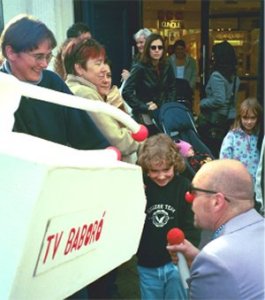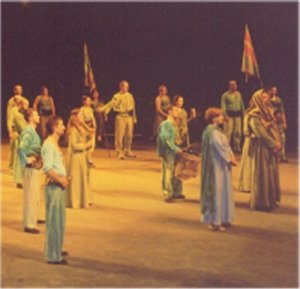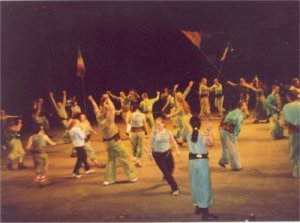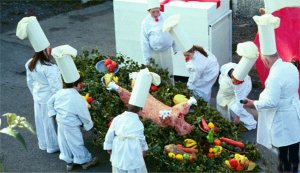What I have been telling anyone who will listen to me is the arts are not the problem, they are the solution. And this is because the arts nurture one of the most important valuable natural resources any country has and it isn't oil, or natural gas, or coal, or lumber or any other physical resource. The arts nurture what I call "rural genius," that special individual resource that turned an inhospitable wilderness into a thriving community.
It is a powerful source of energy but it largely remains hidden, invisible even to those who live it. It has been the fuel that has driven the development of this country. It is the creativeness and innovation that has brought into existence the society in which we now live.
It remains an undiscovered source of energy and many communities are working to unleash this untapped natural resource. Rural genius has been raised and nurtured in rural and small communities and the arts have been a vital part of this.
The arts are an invitation. They invite us to tell our story and they invite us to listen to the story of those around us. They also invite us to celebrate who we are together. For some people, community arts is the new "front porch of America." It is a new gathering place, a means of neighborhood revival, a culture touchstone that is a source of community revitalization. The arts are multicultural and inter-generation, cutting across traditional socioeconomic barriers, bringing people together who would not otherwise be working toward the same goal. They are not limited to the concert hall, the state, or the art conservatories. They are ever present in the public schools and senior citizen centers, recreation programs, art leagues, community theaters, choirs and more. They permeate every level of community life, for the arts, in a number of rural and small communities, are integrated into the everyday lives of their citizens.
The arts nurture rural genius because the arts invite individual expression and self-discovery the arts nurture the imagination and the imagination is perhaps the only hope we have because the imagination enables us to see another way and the arts give us the means by which to bring that vision, that dream, into existence.
The arts are also a way of "remembering the story of a invisible culture." It is a way of giving a name to that which was always nameless. And by giving it a name, it allows them to identify it as something they want to keep, something they have to keep. Cultural organizations all across our country are working to identify and preserve this anvilsible culture, naming it with words such as cultural diversity, community livability, cultural tourism, community cultural planning, and economic development. The arts also transform. They transform individuals and they transform communities. Of this, I can testify myself.
I was 17 years old when a very powerful and very insightful individual called me "poet." And while that was furthest from the reality of my life at the time, I knew the minute I heard the name it was true. And he challenged me the entire time of our all too brief relationship, to nurture that voice within, the vision within, the imagination within. His care, his challenge, his demand of me to give my best, and his love are with me today. Art and the power of art changed my life forever. But, I can not tell you this without having you understand that part of what art did was to drive me into myself, into the deepest part of me, and force me to face and give voice to the pain and the suffering causing my pain. And this is part of the purpose of art, to give voice to what is wrong. Perhaps the most intense part of my testimony on behalf of the NEA was when I discussed this aspect of the role of art in our lives. It was certainly one of the most controversial. But it is the one place where I stated, as clearly as I have ever said, what it is I believe about art and its role in our lives. I would like to cite just a portion of that testimony.

County Galway Community Arts Network.

County Galway Community Arts Network
For people in rural and small communities, art is not past tense, something that has happened an event or a thing. Art is present tense, a verb that excites, challenges, demands, changes, reveals, angers, threatens, and encourages. And yes, it is something that sometimes causes outrage and indignation. But art has always done this. For art has always been the voice of the soul and sometimes the soul for which it speaks is in pain. We may not like what this voice says to us but we can not ignore it either. We may want to turn our head when it becomes uncomfortable or threatening, but to do so is to deny that not all is right with the world. If art is the voice of the soul, then it is a voice that cannot and will not lie.
From the words of the poet in Psalm 130 "out of the depths I cry unto thee oh God," which laments the poet's feeling of being alone and perhaps even deserted by God; to the canvas of Picasso called Gurnica which expressed his outrage of the terror-bombing of civilians during the Spanish Civil War in 1937; to the unsettling photographic images of Robert Mapplethorpe which cry out with all of the anger and outrage of a wounded soul who cannot find peace in a world that refuses to accept who he is, the voice cannot and will not lie.It sometimes speaks of desertion, of being alone, of being angry, because it is. It is sometimes the voice of indignation and protest when the world is unfair because no other voice has the integrity and the courage to do so.
The core value driving my work and upon which I base my entire vision of rural and small communities is this basic orientation of art as the voice of the soul. But I do not want to limit this voice to the individual. I also believe it is the voice of the soul and spirit of a community as well. It is this, one of the most unique aspects of art, that I find most intriguing and fascinating. This is also why I believe the presence and vitality of the arts in a community setting are essential to the growth and perhaps even the continuation of that community of people.
This is what I call community arts development. It isn't community development and it isn't the traditional concept of what most people think of as the arts. It is a combination of both, recognizing that when an individual participates in and experiences the arts on a personal basis, it not only changes that person, but it sets in motion a series of indirect influences that has an impact on the community as a whole. But the focus is on developing a strong, independent, and creative community of arts with the community as a whole. This is a very important distinction. It is not community development theory or a philosophical aesthetic, but rather a theological and moral imperative. It deals with the very nature of the relationship between art and existence.

County Galway Community Arts Network.
I have had the privilege of being part of the arts transforming an entire community. I lived in Boonville, Missouri for over ten years. Of that time, 8 1/2 of those years I was Director of the Boonville Community Arts Program. And when the Friends of Historic Boonville was honored by receiving the Governors Missouri Arts Award, it was one of the proudest days of my life. Not because we got an award, but because over 100 citizens of Boonville were so proud, they traveled to the Capitol Rotunda to be there to participate in the ceremony. It was their award. And they were right.
We built a program that was based on the core value that every single human being has the capacity and the right to express themselves and the arts are one of the ways this can happen. We also learned that, as individuals are transformed, so is the community as a whole not everyone, not 100% but enough for people to know things are different.
I remember one person in particular. His name was Greg. He was the son of a grocery store owner. He had a good voice. Not a great voice, but a good one. He was in his late twenties and used his voice mostly for weddings and funerals. But he had always wanted to be on stage. We did the musical "Bye Bye Birdie" and he was cast as Conrad Birdie, the lead. But he had great difficulty. Up to this point, he had always been able to get along on a good voice by using a mike. But now he not only had to project, he had to take on a very different character than he had ever been before. He had to act. And it was hard because it was embarrassing.
One evening, he finally stopped rehearsal and said he couldn't do it. I sent everyone but Greg home and locked the door to the Theater and went back inside. I told him something that no one else in the cast or the community knew, I had never directed a musical. This was my first one. And if I could do it, by God, he could become Conrad Birdie and I wasn't going to settle for anything less than his very best. He eventually reached inside and found the character and he was great. And it changed his life.

County Galway Community Arts Network.
